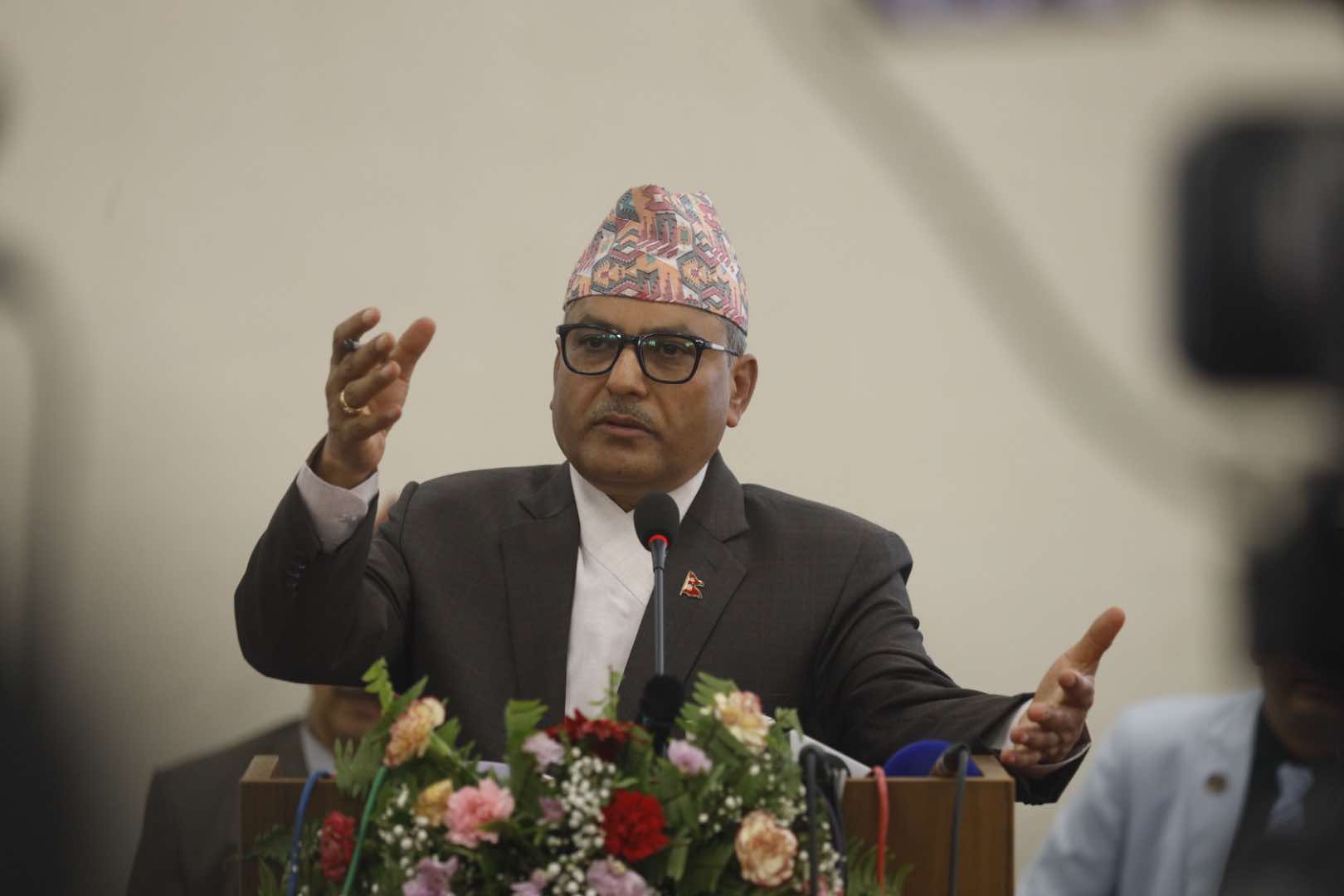Due to lack of electricity, the moisture center is not in use
We use Google Cloud Translation Services. Google requires we provide the following disclaimer relating to use of this service:
This service may contain translations powered by Google. Google disclaims all warranties related to the translations, expressed or implied, including any warranties of accuracy, reliability, and any implied warranties of merchantability, fitness for a particular purpose, and noninfringement.


Potatoes are stored in a traditional house in Dhorpatan Municipality-9 Patan. The Prime Minister's Agriculture Modernization Project is building a new storage facility to be used by the Rudratal Agricultural Group to store in a more systematic manner. The goal is to complete the construction within the current year and store seed potatoes in the coming June.



Local Bhadramani Vick said that the project is going to be built at a cost of 1.5 million by donating local labor equal to 1 million and 5 million rupees.
After this storage, the seeds needed in Dhorpatan area can be made safe. As for eating potatoes, farmers keep them at home and send them to the market when they get a chance.
54 thousand 810 tons of potatoes were produced in 3 thousand 50 hectares of Dhorpatan last year. Although the aim is to make farmers professional by increasing potato production in this area, there are no storage houses. Due to the cold weather, the farmers keep it at home and send it to the market. Dhan Bahadur Kayat, head of Kawa city, said that even though there is a need for organized storage facilities in Dhorpatan area, they have not been built.
'Small investment is not enough, big research is being done,' he said, 'roads will have to be leveled for easy marketing.' Large stores require electrification. Dhorpatan's Burtiwang Bazar only has electricity service. Khim Bahadur Gharti, Chairman of Ward No. 9, says that only after the construction of an additional 30 km long power line to reach Dhorpatan, the possibility of a large store was seen.
The project has also built a seed storage house with a capacity of 10 tons in Tarakhola rural municipality-4 Karimela. The building has been put into operation at a cost of 2.1 lakh for the project and 4.5 lakh for the locals. Om Prasad Kandel, a local farmer, said that the farmers paid the security and electricity costs to Damasahi and put the whole seeds in the storage house.
Some buildings and stores built with partnership and government investment have not been operational. Most of them have suffered from lack of electricity. The 130 ton capacity cold store built in Tamankhola has not been put into operation due to lack of electricity. In the last financial year, 50 million was spent by the provincial government, 4.45 million in the federal government's supplementary budget and 1.5 million by the rural municipality, said Jokalal Budha, chairman of the rural municipality. "We could not put it into use due to lack of electricity," Budha said.
Nepal Electricity Authority Baglung distribution center is preparing to take electricity to that place. Because potatoes are produced in abundance, the farmers who chose that place are worried that they will not be able to use it if there is no electricity. Plans are being made to electrify Tamankhola Rural Municipality, which does not have access to the national transmission line. But the place where this store is built is also 20 km north-east from the municipal center. Last year, with the investment of 11 lakh 78 thousand by the state government, the cold store which has 2 chambers of 10 tons capacity in Nisikhola rural municipality-2 Devisthan multi-purpose cooperative organization has not been operational due to lack of electricity. Kumar Pun, information officer of Agricultural Knowledge Center Baglung, said that the farmers are waiting for the extension of the electricity that has reached the Burtiwang market.
The 50-ton capacity solar storage center in Jaimini municipality-4 Sarkuwa, built by the then Agricultural Development Office, has fallen into disrepair and is not being used. Manoj Rana, Technical Assistant of Jaimani Nagar Agriculture Branch, said that it is more appropriate to build a new one in a suitable place than to spend for repairs. He said that since the potato production in Jaimini-3 is good, next year the municipality is going to make a plan for the warehouse under the Khayan Alu promotion program.
A 20 ton capacity colt room has been built in Ganesh Commercial Agricultural Cooperative Society of Baglung Municipality-8. After the Ministry of Land Management, Agriculture and Cooperatives of Gandaki Province invested 2.1 lakhs three years ago, the cold store was built with an additional labor donation of 4 lakhs by the locals. Oranges are stored at full capacity in this store. The cooperative also paid the electricity tariff regularly. Top Bahadur Khadka and Anant Khadka, members of the same cooperative, have built two cold rooms in their homes with personal investment. 200 quintals of oranges can be stored there.
In Galkot Municipality-3, Siddhabhairav has built a 100 metric ton capacity store for three years with a private investment of Rs. Fruits including potatoes are also stored here. Mahendra Khatri, a member of the group, said that fruits were stored for the dry season and potatoes were sent to the market during the rainy season. This storage center is operating at full capacity. He said that when the capacity is low, the goods sent to the market are kept outside.
Apart from that, potatoes have been kept in a storage center with a capacity of 50 tons in 2007 in Dhamja of Kathekhola rural municipality-3 in partnership with the state government. It is used collectively as a community building. In Kathekhola-6 Bihun, after receiving 500,000,000 support from the state government, the local oranges kept in the cold store of 110,000 tons capacity, which was built for 60,000,000, have been sent to the market by February and March. "It is not enough, it is not even modern, it is only to keep for a few months," said local Yukt Prasad Kandel, "If there is a modern store that can store at least 500 tons, farmers can sell it at a reasonable price."
In Kathekhola-5 and 6, up to 30 million oranges are sold annually by farmers. According to Kandel, if you can store and sell in the summer season than the price you get if you can sell it in November, you will get double benefit. Farmers pay the cost of electricity used in cold storage to Damasahi. There are no employees to operate the said store. Groups of farmers have been using it.
There is no cold store for vegetables and fruits in Baglung market. The Mission Agricultural Cooperative, which operates a fruit shop in Guthi located in Ward 3, has constructed a 10-ton cold room with a subsidy of 1 million from the Ministry of Cooperatives of the province. Although it is in the name of a cooperative, it has been used to store vegetables and fruits individually. Ganga Bahadur Thapa, a leading farmer, said that stores should be built in pocket, block and zone areas of vegetables and fruits to increase local production and make them self-sufficient in agricultural crops and fruits.
"Without stores, many vegetables and fruits rot, they are not available when needed," said Thapa, "Investment is needed for big infrastructure and industry rather than small subsidy programs." He said that there is no investment for milk production and storage either. Baglung, which is nearly self-sufficient in milk, is imported during the dry season. "There will never be a shortage of milk if there is proper store and industry investment," said Yuk Prasad Kandel, a member of the Baglung Milk Cooperative ;
 प्रकाशित : वैशाख ९, २०८१ ०७:४६
प्रकाशित : वैशाख ९, २०८१ ०७:४६

 २७.१२°C काठमाडौं
२७.१२°C काठमाडौं
















